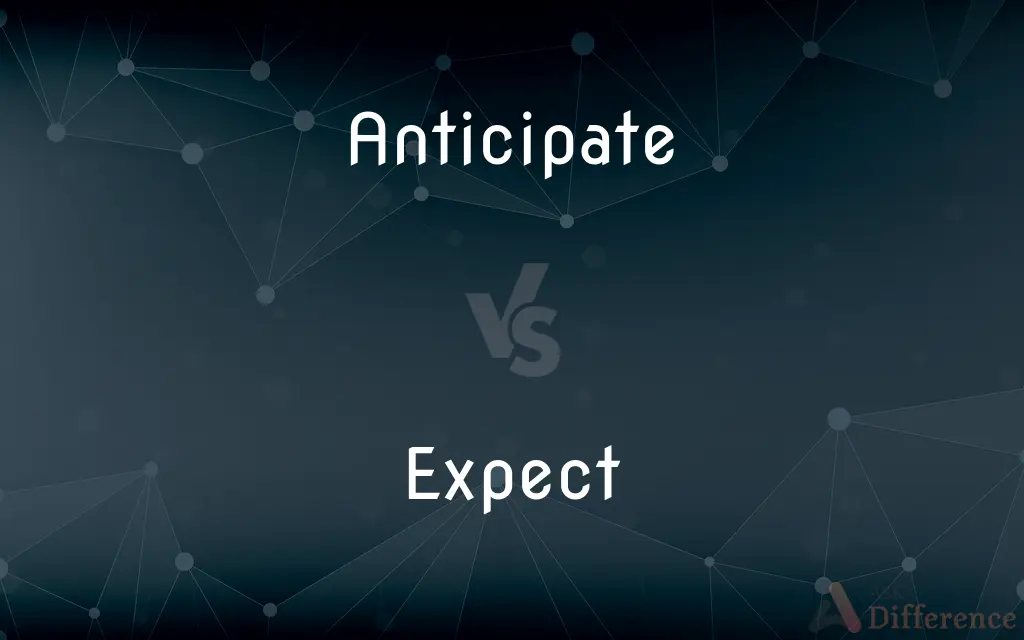Anticipate vs. Expect — What's the Difference?
By Tayyaba Rehman & Fiza Rafique — Updated on March 8, 2024
Anticipate involves looking forward to or preparing for something, while expect assumes something will happen or believes it to be likely.

Difference Between Anticipate and Expect
Table of Contents
ADVERTISEMENT
Key Differences
Anticipate implies a proactive stance, often accompanied by an action or preparation for a future event or situation. It conveys not just the belief that something will happen but also a readiness or preparatory measure taken in advance. For instance, when you anticipate a storm, you might take steps like securing outdoor items or stocking up on essentials. On the other hand, expect denotes a more passive belief or assumption that an event will occur, without necessarily implying any preparatory action. When you expect rain, you believe it will happen, which may not lead you to take any specific actions ahead of time.
While anticipation often carries a connotation of eagerness or looking forward to something, it can also involve a sense of anxiety or concern about dealing with future challenges. In contrast, expectation does not inherently convey eagerness or anxiety but rather a state of considering something as likely to occur, whether it's awaited with positive, negative, or neutral feelings.
Anticipating something often involves a deeper level of engagement with the future scenario, including mental or physical preparation. It suggests an active role in dealing with upcoming events, which can involve strategizing, planning, or even worrying about the unknown. Expecting, however, is more about holding a belief regarding the future, which can be based on past experiences, evidence, or predictions, without necessarily engaging in preparatory actions.
The nuances between anticipate and expect can also be seen in their usage in various contexts. In a business context, anticipating market trends involves not just predicting them but also adjusting strategies accordingly. In contrast, expecting certain market conditions might not lead to immediate action but rather a wait-and-see approach based on those expectations.
Comparison Chart
Definition
Looking forward to or preparing for something.
Believing something will happen or is likely.
ADVERTISEMENT
Connotation
Can imply eagerness or readiness, sometimes anxiety.
More neutral, implies belief or assumption.
Action
Often involves preparation or pre-emptive measures.
Does not inherently involve preparation.
Engagement
Implies a deeper level of engagement with the future.
Primarily involves holding a belief.
Usage
Used when there's an element of foresight and readiness.
Used when there's certainty or likelihood without detailed foresight.
Compare with Definitions
Anticipate
To look forward to with eagerness or pleasure.
She anticipates the summer vacation with great excitement.
Expect
To regard something as likely to happen.
I expect they will arrive by noon.
Anticipate
To consider something beforehand.
The author anticipated potential criticism in his preface.
Expect
To consider something as due or necessary.
She expects an apology from him.
Anticipate
To expect and prepare for something.
They anticipated heavy traffic and left early.
Expect
To require or demand.
The job expects a high level of commitment.
Anticipate
To deal with something before it happens.
Good leaders anticipate problems before they arise.
Expect
To foresee something happening.
We expect the project to be completed by the end of the year.
Anticipate
To foresee and act in advance of.
The city anticipated the heavy snowfall by salting the roads.
Expect
To believe something without doubt.
He expects that the weather will be good for the event.
Anticipate
Regard as probable; expect or predict
She anticipated scorn on her return to the theatre
It was anticipated that the rains would slow the military campaign
Expect
Expect is an extension to the Tcl scripting language written by Don Libes. The program automates interactions with programs that expose a text terminal interface.
Anticipate
Act as a forerunner or precursor of
He anticipated Bates's theories on mimicry and protective coloration
Expect
Regard (something) as likely to happen
One might expect that Hollywood would adjust its approach
It's as well to expect the worst
The hearing is expected to last a week
Anticipate
To see as a probable occurrence; expect
We hadn't anticipated the crowds at the zoo. I anticipated that you might be in a hurry.
Expect
To look forward to the probable occurrence or appearance of
Expecting a phone call.
Expects rain on Sunday.
Anticipate
To think of (a future event) with pleasure; look forward to
She anticipated a pleasant hike in the country.
Expect
To consider likely or certain
Expect to see them soon. See Usage Note at anticipate.
Anticipate
To deal with beforehand; act so as to mitigate, nullify, or prevent
We anticipated the storm by boarding up the windows.
Expect
To consider reasonable or due
We expect an apology.
Anticipate
To react to (someone) abruptly, especially to prevent someone from continuing or progressing
"Immediately he regretted his words and started to add.
Expect
To consider obligatory; require
The school expects its pupils to be on time.
Anticipate
To act in a way that blocks or vitiates the action of (another)
"Professor Thomson had anticipated me and had obtained many patents on this principle" (Nikola Tesla).
Expect
(Informal) To presume; suppose.
Anticipate
To serve as a forerunner to or previous indication of
Her research in the previous decade anticipated these findings.
Expect
To be pregnant. Used in progressive tenses
My wife is expecting again.
Anticipate
To use in advance, as income not yet available.
Expect
(ambitransitive) To predict or believe that something will happen
I expect to be able to walk again after getting over my broken leg.
He never expected to be discovered.
We ended up waiting a little longer than we had expected
The doctor said he expected me to make a full recovery.
Anticipate
To pay (a debt) before it is due.
Expect
To consider obligatory or required.
Anticipate
To think, speak, or write about a matter in advance.
Expect
To consider reasonably due.
You are expected to get the task done by the end of next week.
Anticipate
(transitive) To act before (someone), especially to prevent an action.
Expect
(continuous aspect only, of a woman or couple) To be pregnant, to consider a baby due.
Anticipate
To take up or introduce (something) prematurely.
The advocate plans to anticipate a part of her argument.
Expect
To wait for; to await.
Anticipate
To know of (something) before it happens; to expect.
To anticipate the pleasures of a visit
To anticipate the evils of life
Please anticipate a journey of an hour from your house to the airport
Expect
To wait; to stay.
Anticipate
To eagerly wait for (something)
Little Johnny started to anticipate the arrival of Santa Claus a week before Christmas.
Expect
To wait for; to await.
Let's in, and there expect their coming.
Anticipate
To be before in doing; to do or take before another; to preclude or prevent by prior action.
To anticipate and prevent the duke's purpose.
He would probably have died by the hand of the executioner, if indeed the executioner had not been anticipated by the populace.
Expect
To look for (mentally); to look forward to, as to something that is believed to be about to happen or come; to have a previous apprehension of, whether of good or evil; to look for with some confidence; to anticipate; - often followed by an infinitive, sometimes by a clause (with, or without, that); as, I expect to receive wages; I expect that the troops will be defeated.
The Somersetshire or yellow regiment . . . was expected to arrive on the following day.
Anticipate
To take up or introduce beforehand, or before the proper or normal time; to cause to occur earlier or prematurely; as, the advocate has anticipated a part of his argument.
Expect
To wait; to stay.
Anticipate
To foresee (a wish, command, etc.) and do beforehand that which will be desired.
Expect
Expectation.
Anticipate
To foretaste or foresee; to have a previous view or impression of; as, to anticipate the pleasures of a visit; to anticipate the evils of life.
Good with badExpect to hear; supernal grace contendingWith sinfulness of men.
I would not anticipate the relish of any happiness, nor feel the weight of any misery, before it actually arrives.
Timid men were anticipating another civil war.
Expect
Regard something as probable or likely;
The meteorologists are expecting rain for tomorrow
Anticipate
Regard something as probable or likely;
The meteorologists are expecting rain for tomorrow
Expect
Consider obligatory; request and expect;
We require our secretary to be on time
Aren't we asking too much of these children?
I expect my students to arrive in time for their lessons
Anticipate
Act in advance of; deal with ahead of time
Expect
Look forward to the probable occurrence of;
We were expecting a visit from our relatives
She is looking to a promotion
He is waiting to be drafted
Anticipate
Realize beforehand
Expect
Consider reasonable or due;
I'm expecting a full explanation as to why these files were destroyed
Anticipate
Make a prediction about; tell in advance;
Call the outcome of an election
Expect
Be pregnant with;
She is bearing his child
The are expecting another child in January
I am carrying his child
Anticipate
Be excited or anxious about
Expect
Look forward to the birth of a child;
She is expecting in March
Anticipate
Be a forerunner of or occur earlier than;
This composition anticipates Impressionism
Common Curiosities
Is expecting always passive?
While expecting can be more passive than anticipating, it can still involve mental preparation or a readiness to respond to the expected outcome.
How does expecting differ from anticipating?
Expecting involves believing that something will happen, without necessarily taking preparatory actions, while anticipating involves both foresight and preparation.
How do businesses use anticipation in strategy?
Businesses use anticipation to foresee market trends, customer needs, or potential challenges and adapt their strategies proactively to address them.
What does it mean to anticipate an event?
To anticipate an event means to foresee it and prepare for it in advance, often with a sense of readiness or eagerness.
Does anticipation always lead to better outcomes than expectation?
Anticipation, with its focus on preparation and readiness, can often lead to better outcomes, especially in situations requiring proactive measures.
How does psychology interpret anticipation and expectation?
Psychology views anticipation as a cognitive process involving future-oriented thinking and preparation, while expectation involves the belief in the occurrence of a future event.
How do anticipation and expectation influence decision-making?
They influence decision-making by shaping how individuals assess risks, consider future possibilities, and prepare for potential outcomes.
Can expectations change over time?
Yes, expectations can evolve based on new information, experiences, or changes in circumstances.
How do cultural differences impact anticipation and expectation?
Cultural norms and values can influence what people anticipate or expect, shaping their preparedness and beliefs about future events.
Are there any negative aspects of anticipation or expectation?
Excessive anticipation can lead to anxiety, while unrealistic expectations can result in disappointment.
Can anticipation involve anxiety?
Yes, anticipation can involve anxiety, especially when it relates to preparing for challenging or uncertain situations.
Is it possible to anticipate something without expecting it?
It's generally rare, as anticipation usually involves a degree of expectation, but one might prepare for unlikely scenarios without truly expecting them to occur.
How can one manage unrealistic expectations or anticipations?
Managing unrealistic expectations or anticipations involves setting realistic goals, staying informed, and adjusting perspectives based on experience and feedback.
In what scenarios is it more useful to anticipate rather than expect?
In scenarios requiring action or preparation, such as competitive business environments or emergency planning, anticipation is more useful.
Can one's expectations affect their level of anticipation?
Yes, high expectations can increase anticipation, especially if the outcome is eagerly awaited or significant.
Share Your Discovery

Previous Comparison
Chinese vs. Korean
Next Comparison
Buffet vs. CarveryAuthor Spotlight
Written by
Tayyaba RehmanTayyaba Rehman is a distinguished writer, currently serving as a primary contributor to askdifference.com. As a researcher in semantics and etymology, Tayyaba's passion for the complexity of languages and their distinctions has found a perfect home on the platform. Tayyaba delves into the intricacies of language, distinguishing between commonly confused words and phrases, thereby providing clarity for readers worldwide.
Co-written by
Fiza RafiqueFiza Rafique is a skilled content writer at AskDifference.com, where she meticulously refines and enhances written pieces. Drawing from her vast editorial expertise, Fiza ensures clarity, accuracy, and precision in every article. Passionate about language, she continually seeks to elevate the quality of content for readers worldwide.
















































